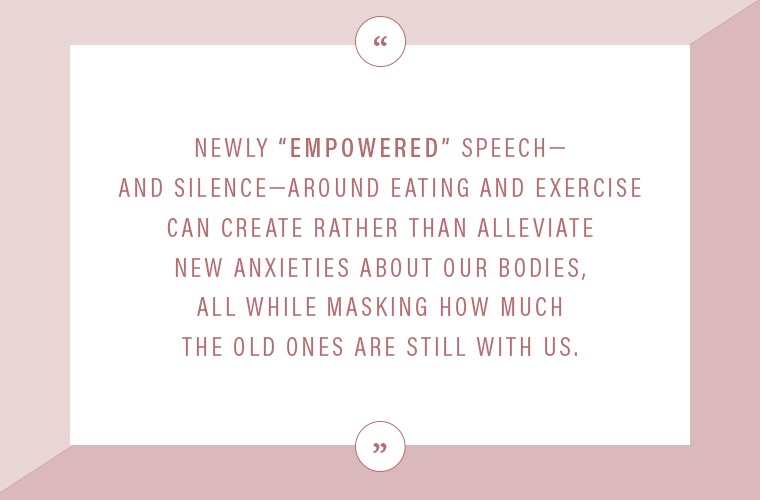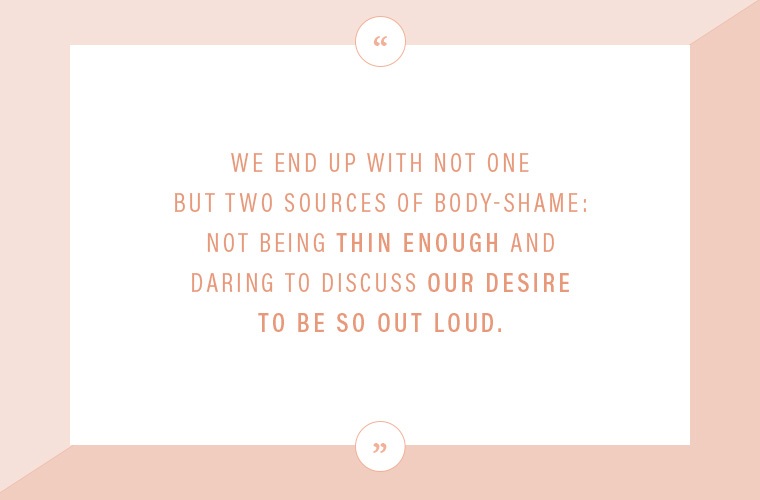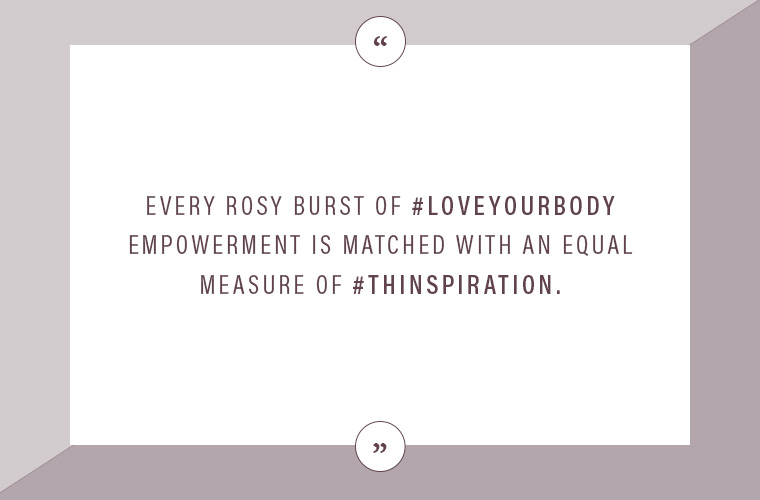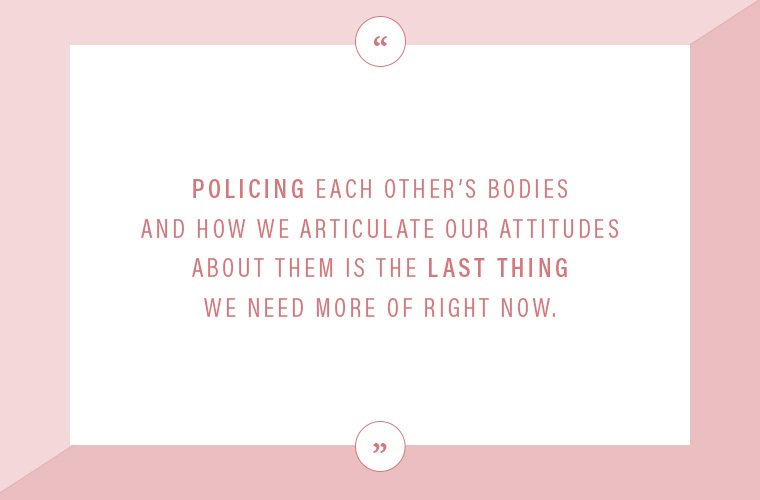How “Empowered” Speech About Your Body Might Mask the Same Old Issues
As both a professor and a fitness instructor, there's one question in my life that just keeps coming up in the studio and in the seminar room: What can I do to resist a weight-loss culture so ubiquitous that our go-to female bonding rituals include comments like "I ate so much" or "Do these jeans make me look fat?" That the ads urging us to "get a summer body" start long before the temps rise above sweater weather?
My stock answer so far: Telling women and girls whenever I get the chance, "Stop using diet talk as a conversation starter!"
That way, I reason, we can start to change how we speak about ourselves and to each other. And maybe we'll begin to explode the assumption that vigilantly watching waistlines and counting calories is a core responsibility of womanhood.
Lately, though, while I still embrace the intent, I have become less sure about this strategy.
Of course, many feminists point out the damage diet talk can do, and maybe the message is sinking in: Women’s Health banned “bikini body” from its cover (a phrase Well+Good has deliberately never endorsed), Refinery29 features plus-size models in photos for articles that aren’t about plus-size women, and even Weight Watchers—whose core business is weight loss—has rebranded to emphasize wellness and self-care over watching the scale.
Body positivity is a potentially paradigm-shifting movement that has expanded far beyond the borders of Instagram with a power that would have been unimaginable back in 1973, when the radical Fat Liberation Manifesto proclaimed “Fat People of the World Unite—You Have Nothing to Lose!” From that perspective, our current moment should feel triumphant and in some ways it truly does. But lately, I worry, newly “empowered” speech—and silence—around eating and exercise can create rather than alleviate new anxieties about our bodies, all while masking how much the old ones are still with us.

Given I research feminism and fitness as a profession, I am embarrassed to admit that I figured this out during a decidedly intimate moment. Several months after giving birth, I was buttoning into a smaller pair of (non-stretch!) jeans than I had worn in years, and I was positively gleeful. Yet smiling at the size on the label and the number on the scale, I also felt an unmistakable, familiar guilt. A decade earlier, I had just started grad school and had begun to identify as a feminist. Reading in the growing field of Fat Studies, which applied Naomi Wolf’s critique of beauty culture-as-patriarchy to fitness, I no longer could look at exercise (which I was, by most standards, obsessive about) in the same way.

{{post.sponsorText}}
Specifically, I no longer wanted to admit that in addition to the community and confidence I found at the gym, I also loved that it made me thinner. Finding joy in a space so strongly defined by disempowering diet talk (and it really was in those days: think “inspirational” cues like, “Be good now if you were bad at dessert!” and “Torch that fat!”) was basically playing into the patriarchy, as I understood it. Unable to find words to reconcile this tension, I would literally stuff my spandex underneath my notebooks when I went to TA Feminist Studies, an unsustainable situation that forced me to figure out a healthier relationship to exercise, food, and my body.
Fast-forward to 2009 and post-baby me—still feminist and body-conscious, if less obsessively so—had a sleek, woke new vocabulary to resolve that pesky contradiction between the pursuit of thinness and my progressive politics. I wasn’t restricting; I was “eating clean.” I wasn’t counting calories; I was practicing “mindful eating.” I wasn’t lightheaded from starving; “detoxing” isn’t supposed to be easy. This was no diet; this was self-care. I might be dropping weight even faster on this organic juice cleanse than when I used to pop pills from a jar labeled DIET FUEL in neon red, but no way was this disempowering, I thought. Is this what Audre Lorde meant by "political warfare"?
The language of the wellness boom, newly mainstream in the first decade of the 21st century, allowed me to conform to persistent societal demands to pursue thinness while convincing myself—and others, on this new thing called social media—that I was engaged in a noble project that promoted my health, autonomy, and even the environment (those organic juices were locally sourced and packaged in BPA-free bottles, of course). Emily Contois, however, a PhD candidate at Brown University researching diet culture sees continuities between these apparently distinct paradigms: “The moral logic underlying 'old fashioned' diet talk and today’s 'clean eating' is the same, as it draws binary divisions between good/bad and clean/dirty.”

I’m not alone in this rhetorical repackaging. At a cocktail party recently, a friend openly announced she was gluten-free and then whispered to me as she patted her flat stomach, “It’s amazing—I now know on Passover, Thanksgiving… I won’t gain a pound!” I asked why the hushed tone and she expressed what writer Marisa Meltzer has called the “last feminist taboo”: despite cultural pressure to lose weight, admitting to dieting suggests being “slave to the man.” I’m all for emancipating ourselves from outdated aesthetic norms and practices, yet when those old diet imperatives just won’t die and new rhetoric makes them harder to detect, we end up with not one but two sources of body shame: not being thin enough and daring to discuss our desire to be so out loud.
And so body positivity, born as an empowering way for women to resist diet discourse, has created its own double bind—and the consequences are becoming clear.
Everyday Feminism received so many letters from readers worried about the hypocrisy of standing as a “feminist, waving the flag for body positivity, when sometimes you can’t even get out of bed because you hate your body so much” that they published tips on how to cope with this (additional) anxiety now suffered by those with eating disorders.
Professor Rachel Adams watched some of her students in a Food Studies class go to “dietary extremes”—one apparently eating enough carrot soup to turn orange—while framing their eating choices in the language of “food justice” and “sustainable eating” instead of the unabashed diet talk that Adams and I remember from an era of meal-skipping and diet soda, when an eating disorder was easier to identify. Christian Jessen, MD, an eating-disorder specialist, specifically attacked sites like Goop for deluding vulnerable teenagers into thinking they are pursuing a “healthy lifestyle” or “clean eating” when “actually all it was doing was helping them hide their increasingly disordered eating.”

But how widespread of a problem is this new set of pressures, really? Depending which neighborhoods of the internet you frequent, it’s possible to believe we’re either in a brave new age of body-positive, wellness-focused imagery—which brings with it the challenges above—or precisely the opposite. Every rosy burst of #loveyourbody empowerment is matched with an equal measure of #thinspiration (a term banned by Instagram, which recently re-emerged as #bonespiration). And as trendy as it has become to blame Gwyneth Paltrow for all social ills, Goop’s 600K Instagram followers are dwarfed by the #fitfam’s biggest social media successes, like the Tone It Up duo's 1.2 million followers (and Kayla Itsines' nearly 8 million), who enthusiastically post old-school before-and-after photos.
Yet 20 years after women’s gym impresario Lucille Roberts bluntly said, "It is only the upper classes who are into exercise for health…The middle classes just want to look good…They just want to fit into tight jeans,'" the body-positivity and the wellness movement is no longer so niche. Even the Lucille Roberts website promotes “women training fearlessly” and Itsines feels the need to clarify that “bikini body” is really just shorthand for “confidence.”
Such bizarre juxtapositions are a hallmark of our moment, when a generation that might very well have read The Beauty Myth over fat-free fro-yo enjoys genuine progress toward celebration of a greater range of bodies (not just in terms of size, but also race, ability, and gender). But the internalized pressure to equate thinness with self-worth is, thanks to social media, more pervasive than ever. If it seems women are too tenaciously hanging onto these ideas, it’s not because we are superficial fools, but because thin privilege is undeniable, as much as we earnestly strive to overcome it. As Lindsay Kite, PhD, puts it, "Women's bodies are valued more than women themselves."
Some cynically exploit this dynamic—like this ill-conceived partnership between ThinkThin and Wonder Woman—but most of us are just left confused by how to navigate it. A prominent fitness personality whose official account is all about “body bravery” recently shared an Instagram story chronicling her trip to a Botox clinic. Since I have met her before, I typed (and then deleted) several messages pointing out what I first understood as hypocrisy. A couple of days later she wrote a long post on her personal Facebook page leading with the question, "DO YOU REALLY, TRULY LOVE YOUR BODY?" and wondering whether "this whole body-positivity movement is just BS."
Just like all of us, she is finding her way in a world that constantly reminds us to be young and thin, but now increasingly chastises us for admitting we just might want that very thing.

So what now? The good news is that the confusing messaging of our moment might signal an opportunity to move past the drama of this double bind. Simpler times were hardly better, of course. Consider the bad old days of the unapologetic diet talk that dominated much of the last century, when the fact that "reducing has become every woman's concern" was so widely accepted that The New York Times in the 1920s named and shamed "women fat fighters" (with before-and-after weights!) and detailed "defeats" such as that of Ms. Dorothy Kaplan of Brooklyn, who gained four pounds after overdoing it on strawberries and whipped cream at a Decoration Day picnic.
In the spirit of moving forward, there’s work we can do now to understand and unmake this double bind. For one, what if we thought about weight loss, and physical transformation goals in general, as something more nuanced than a monolithically oppressive cultural norm? Losing weight—as even the very body-posi Health at Every Size movement acknowledges—can be a positive goal, just not when it looms so large that we go to self-destructive ends to achieve it.
So let’s drop the moralizing. Fat isn’t "bad," eating Fritos doesn’t make you "unclean," and not loving your body all the time doesn’t make you "ungrateful." Similarly, you can simultaneously love your body and want to work on it, and how you go about that change matters.
Isn’t there a difference in hearing a fitness instructor "motivate" you to "make that muffin top disappear" (using a term of derision for what you dislike about yourself), versus "get lean, strong, and energized"—focusing on what you are working towards? (This is a real question a founder of a leading studio asked me at a recent workshop; she feels clients now "secretly" show up to change their bodies, yet she can no longer acknowledge those goals "or I’ll be accused of 'fat-shaming.'")
Policing each other's bodies and how we articulate our attitudes about them is the last thing we need more of right now. In a moment when we’re confronted with both the same old messages to make our wrinkles and baby weight vanish—and the wholly new imperative to muster the strength to "love our bodies" unconditionally despite so much out there telling us otherwise—perhaps the best we can do is to remember that "failing" to do either is as much as result of social context as individual will, and maybe that humility will make our sisterhood—and our bodies—grow stronger.
 Meet Well+Good’s fitness historian, Natalia Petrzela, PhD, a history professor at The New School in New York City and a premier IntenSati instructor, who shares how the sweaty past informs the present in this column.
Meet Well+Good’s fitness historian, Natalia Petrzela, PhD, a history professor at The New School in New York City and a premier IntenSati instructor, who shares how the sweaty past informs the present in this column.
Want to boost your fitness history brainpower? Check out Petrzela's takes on wellness' role in activism and the hottest fitness crazes of your great-grandma's day.
Loading More Posts...